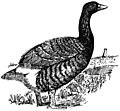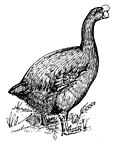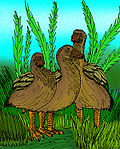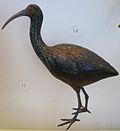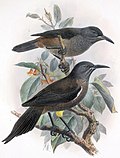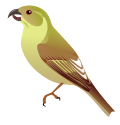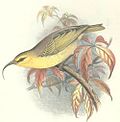Top Qs
Timeline
Chat
Perspective
List of Hawaiian animals extinct in the Holocene
From Wikipedia, the free encyclopedia
Remove ads
This is a list of Hawaiian animal species extinct in the Holocene that covers extinctions from the Holocene epoch, a geologic epoch that began about 11,650 years before present (about 9700 BCE)[a] and continues to the present day.[1]


The Hawaiian Islands include the eight major islands (the Windward Islands) and the small islands and atolls of the Northwestern Hawaiian Islands. They are all part of the U.S. state of Hawaii, except Midway Atoll, which is a separate U.S. territory.[2]
The islands of East Polynesia (including New Zealand, Hawaii, and Easter Island) were among the last habitable places on earth colonized by humans.[3] Estimates for the timing of Polynesian settlement in Hawaii have been uncertain,[4] but a 2010 study based on radiocarbon dates of more reliable samples suggests that Hawaii was first settled by humans roughly between 1219 and 1266 CE.[3] In 1778, British explorer James Cook became the first recorded European to arrive in Hawaii. An influx of European and American explorers, traders, and whalers arrived shortly after. Hawaii was annexed by the United States in 1898 and became a state in 1959.[5]
Numerous species have disappeared from Hawaii as part of the ongoing Holocene extinction, driven by human activity. Human contact, first by Polynesians and later by Europeans, had a significant impact on the environment. Both the Polynesians and Europeans cleared native forests and introduced non-indigenous species for agriculture (or by accident), driving many endemic species to extinction. Fossil finds in caves, lava tubes, and sand dunes have revealed that Hawaii once had a native eagle,[6] two raven-size crows, several bird-eating owls, and giant ducks known as moa-nalo. Today, many of Hawaii's remaining endemic species of plants and animals are considered endangered. Hawaii has more endangered species and has lost a higher percentage of its endemic species than any other U.S. state.[7] The endemic plant Brighamia now requires hand pollination because its natural pollinator is presumed to be extinct.[8]
This list of extinct species only includes the indigenous biota of Hawaii, not domestic animals like the Hawaiian Poi Dog. Many extinction dates are unknown due to a lack of relevant information.
Remove ads
Mammals (class Mammalia)
Bats (order Chiroptera)
Vesper bats (family Vespertilionidae)
Birds (class Aves)
Waterfowl (order Anseriformes)
Ducks, geese, and swans (family Anatidae)
Rails and cranes (order Gruiformes)
Rails (family Rallidae)
Shorebirds (order Charadriiformes)
Gulls, terns, and skimmers (family Laridae)
Albatrosses and petrels (order Procellariiformes)
Petrels and shearwaters (family Procellariidae)
Pelicans, herons, and ibises (order Pelecaniformes)
Ibises and spoonbills (family Threskiornithidae)
Hawks and relatives (order Accipitriformes)
Hawks, eagles, kites, harriers and Old World vultures (family Accipitridae)
Owls (order Strigiformes)
True owls (family Strigidae)
Perching birds (order Passeriformes)
Crows and relatives (family Corvidae)
Extinct in the wild, crows and relatives (family Corvidae)
Reed warblers (family Acrocephalidae)
Hawaiian honeyeaters (family Mohoidae)
Thrushes (family Turdidae)
Possibly extinct, thrushes (family Turdidae)
True finches (family Fringillidae)
Possibly extinct, true finches (family Fringillidae)
Incertae familiae
Remove ads
Insects (class Insecta)
Dragonflies and damselflies (order Odonata)
Narrow-winged damselflies (family Coenagrionidae)
Possibly extinct
Grasshoppers, locusts, and crickets (order Orthoptera)
True crickets (family Gryllidae)
Extinct in the wild
True bugs (order Hemiptera)
Mealybugs (family Pseudococcidae)
Beetles (order Coleoptera)
True weevils (family Curculionidae)
Butterflies and moths (order Lepidoptera)
Pyralid moths (family Pyralidae)
Owlet moths (family Noctuidae)
Possibly extinct, owlet moths (family Noctuidae)
Data deficient, owlet moths (family Noctuidae)
Geometer moths (family Geometridae)
True flies (order Diptera)
Long-legged flies (family Dolichopodidae)
Fruit flies and relatives (family Drosophilidae)
Remove ads
Snails and slugs (class Gastropoda)
Order Stylommatophora
Family Achatinellidae
Family Amastridae
Family Pupillidae
Remove ads
See also
- Endemism in the Hawaiian Islands
- List of endemic birds of Hawaii
- List of Oceanian species extinct in the Holocene
- List of Australia-New Guinea species extinct in the Holocene
- List of New Zealand species extinct in the Holocene
- List of North American animals extinct in the Holocene
- List of extinct bird species since 1500
- Holocene extinction
Notes
Remove ads
References
Wikiwand - on
Seamless Wikipedia browsing. On steroids.
Remove ads

